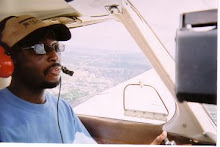(This article from the February issue of AOPA Flight Training, has resulted in me receiving a lot of positive e-mail from many across the country, including people from organ transplant agencies, high school, old co-workers and even people who work at the Cleveland Clinic. We, in the organ transplant business, can not thank Mike Collins an staff enough for demonstrating the positives from life saving organ transplants.)
Flying to Inspiring and Motivate Others
As a child, Grier, now 51, spent summers with his father in Nashville. And he disliked airplanes. “I had no interest in flying until I took my first trip back from Nashville. I hated it. Then on my second trip, I remember the stewardess taking me up front to the cockpit. The flight crew was really nice. That was a Lockheed Electra. And then I was really hooked,” he said. “Growing up, I read more flying magazines and books than I did my regular schoolwork. That was reflected in my grades.”
He took his first two flying lessons at Cornelia Fort Airpark in Nashville when he was 14. “Now that’s on my list of places to fly when I get my license,” Grier noted. A couple of years later, he trained at the long-gone Chagrin Falls Airport southeast of Cleveland, but never soloed. A vision problem prevented him from getting a medical certificate; the cause eluded him for nine years but the solution, it turned out, was as simple as changing contact lenses.
At that point Grier had to take another break. “I didn’t lose interest, but other things were going on in my life, and flying had to be put on hold. For another five years, flying was always on my mind,” he added. When he found out he had a daughter on the way, his grounding was extended. “At that point I pretty much gave up on it—but I didn’t forget about it.”
Then he got sick. After a year and a half of illness, Grier received a liver transplant in 1997. “I thought I might as well give up on flying completely,” he recalled.
He recovered and went back to work in the mortgage industry and providing technical support. But Grier became ill again. “My liver was failing, and my kidneys were failing because the medication you take is toxic to the kidneys,” he explained. In 2007 he received a double transplant—a liver and one kidney.
“When you’re lying there in the hospital, you start thinking about a lot of things. Part of it is that you’ve got to maximize your opportunities,” he said. “I was upset that I’d never completed my goal of becoming a pilot. I guess this is my second chance.”
Grier said he got out of bed, went down the hall—with his IV pole in tow—to a computer, and in 10 minutes found out there were pilots flying with transplants. “I saw that there were about 200 pilots with transplants, including heart transplants.” Kidneys are most common, followed by livers, he said.
“I spent that night in my bed—my mind was racing, because I could have been [flying],” Grier said. Four days before the one-year anniversary of his second transplant surgery, he visited his aviation medical examiner. The FAA came back to him twice for additional records. In July 2008, 65 days after the exam, his medical certificate arrived in the mail.
Grier passed his knowledge test and then resumed flight training as his finances allowed. He soloed on October 19, 2009. “I was amazed at how quickly
the aircraft jumped off the ground with just me in it. Then when I was on downwind it occurred to me, ‘I’m by myself.’”
Now Grier is preparing for his dual cross-countries, and hopes to take his checkride in March or April 2010. That’s important, because he’s planning a flight to Madison, Wisconsin, in late July for the National Kidney Foundation’s Transplant Games. The biennial track and field events roughly parallel the summer Olympics, and Grier hopes to compete in bowling and maybe volleyball.
People—especially transplant recipients—are surprised to find out he’s becoming a pilot. “I see patients every Wednesday in the transplant center at the
Cleveland Clinic, and a lot of them get very pumped up when they learn that. They think, ‘What can I do?’ It inspires and motivates them to reach for their goals,” he said. “They need to be reminded of where they can go.”
Eventually, Grier would like to fly for Angel Flight or a similar organization. “If patients see me doing all of this and it motivates them—and I can say, ‘Oh, by the way, I know what you’re going through, I’ve been there’—patients have told me that would be a big kick.”
Mike Collins is technical editor for AOPA Publications
Tuesday, February 2, 2010
Subscribe to:
Post Comments (Atom)


1 comment:
Hi, David.
This is Sylvia Leach at TRIO. We would like to publish your story in TRIO's national newsletter. I need to communicate with you. Please email me at sleach@trioweb.org.
Thanks.
Post a Comment